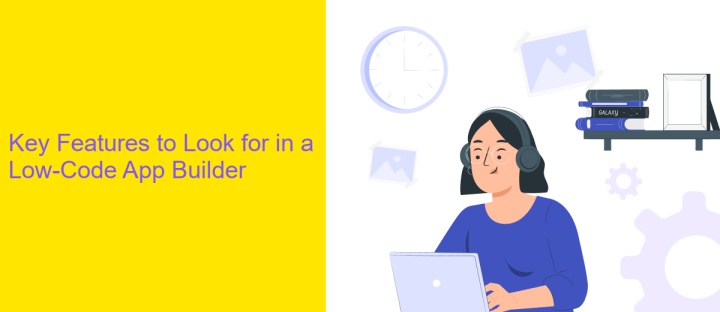Best Low-Code App Builder
In the rapidly evolving digital landscape, businesses and developers are constantly seeking efficient solutions to streamline application development. Low-code app builders have emerged as a game-changer, empowering users to create robust applications with minimal coding expertise. This article explores the best low-code app builders available today, highlighting their features, benefits, and how they can transform your development process, saving time and resources.
Introduction: What is Low-Code and Why Use a Low-Code App Builder?
Low-code development platforms are revolutionizing the way applications are built by minimizing the need for extensive coding. These platforms provide a visual interface, enabling users to create applications through drag-and-drop components and model-driven logic. This approach significantly reduces development time and allows individuals with minimal coding experience to participate in the app creation process.
- Accelerated development process
- Reduced costs and resource requirements
- Increased agility and adaptability
- Enhanced collaboration between IT and business teams
- Improved innovation and faster iteration cycles
Utilizing a low-code app builder empowers organizations to swiftly respond to market demands and technological changes. By simplifying the development process, businesses can focus on delivering high-quality applications that meet user needs while maintaining flexibility and scalability. This approach not only democratizes app development but also fosters innovation by allowing diverse teams to contribute their ideas and expertise.
Key Features to Look for in a Low-Code App Builder

When selecting a low-code app builder, it's crucial to prioritize a user-friendly interface that allows both technical and non-technical users to create applications effortlessly. An intuitive drag-and-drop functionality can significantly enhance the development process, enabling users to visualize their app's design and functionality in real-time. Additionally, robust template libraries can provide a head start, offering pre-built components that can be easily customized to suit specific needs.
Integration capabilities are another key feature to consider. A good low-code platform should seamlessly connect with existing systems and third-party services. For instance, ApiX-Drive can be a valuable tool, allowing users to automate workflows by integrating various apps without extensive coding knowledge. Furthermore, ensure the platform supports scalability and security, as these are vital for handling growth and protecting sensitive data. Lastly, look for comprehensive support and documentation to assist users throughout their development journey.
Top Low-Code App Builders: Detailed Comparison

Low-code app builders have revolutionized the way businesses develop applications, offering powerful tools with minimal coding required. These platforms provide a user-friendly interface, allowing developers and non-developers alike to create functional apps efficiently. Below is a detailed comparison of some of the top low-code app builders available today.
- OutSystems: Known for its robust features and scalability, OutSystems offers a comprehensive suite of tools for enterprise-grade applications.
- Mendix: With a strong focus on collaboration and rapid development, Mendix provides an intuitive platform for building a wide range of applications.
- Appian: Appian excels in process automation and offers a seamless integration with various enterprise systems, making it ideal for complex workflows.
- Microsoft Power Apps: Part of the Microsoft ecosystem, this platform is perfect for businesses already using Microsoft products, offering seamless integration and ease of use.
- Zoho Creator: Zoho Creator is known for its affordability and flexibility, catering to small to medium-sized businesses with diverse app needs.
Each of these platforms has its strengths, catering to different business needs and technical requirements. By understanding their unique features, businesses can select the most suitable low-code app builder to accelerate their digital transformation journey.
Choosing the Right Low-Code Platform for Your Needs

When selecting a low-code platform, it's crucial to align the platform's capabilities with your specific business needs. Start by identifying the types of applications you aim to build and the technical expertise available in your team. This will help you filter out platforms that don't match your requirements.
Consider the scalability and flexibility of the platform. You want a solution that can grow with your business and adapt to changing needs. Evaluate the ease of integration with existing systems and the platform's support for various data sources. A platform that seamlessly integrates can save time and reduce complexity.
- Assess the user interface for intuitiveness and ease of use.
- Check for robust security features to protect sensitive data.
- Look for a strong community and support network for troubleshooting.
- Review pricing models to ensure they fit your budget.
Finally, take advantage of free trials or demos to test the platform's features firsthand. This hands-on experience can provide valuable insights into how well the platform meets your needs and how comfortable your team will be using it regularly.


The Future of Low-Code App Development
The future of low-code app development is poised to revolutionize the way businesses approach software creation. As technology continues to evolve, low-code platforms are becoming increasingly sophisticated, allowing developers and non-developers alike to create complex applications with ease. This democratization of app development empowers organizations to be more agile and responsive to market changes, reducing the time and cost associated with traditional coding methods. Moreover, the integration of AI and machine learning into low-code platforms is expected to further enhance their capabilities, enabling smarter and more efficient app development processes.
In addition, the ability to seamlessly integrate various services and applications is crucial for modern businesses. Platforms like ApiX-Drive are at the forefront of this trend, offering tools that simplify the integration process. By providing a user-friendly interface for connecting disparate systems, such services ensure that businesses can automate workflows and enhance productivity without the need for extensive technical expertise. As low-code development continues to gain traction, the demand for such integrative solutions will likely grow, paving the way for more interconnected and efficient digital ecosystems.
FAQ
What is a low-code app builder?
How can low-code app builders benefit businesses?
Are low-code platforms suitable for complex applications?
How do low-code platforms handle integrations with other services?
What are the security considerations when using low-code platforms?
Apix-Drive is a simple and efficient system connector that will help you automate routine tasks and optimize business processes. You can save time and money, direct these resources to more important purposes. Test ApiX-Drive and make sure that this tool will relieve your employees and after 5 minutes of settings your business will start working faster.

